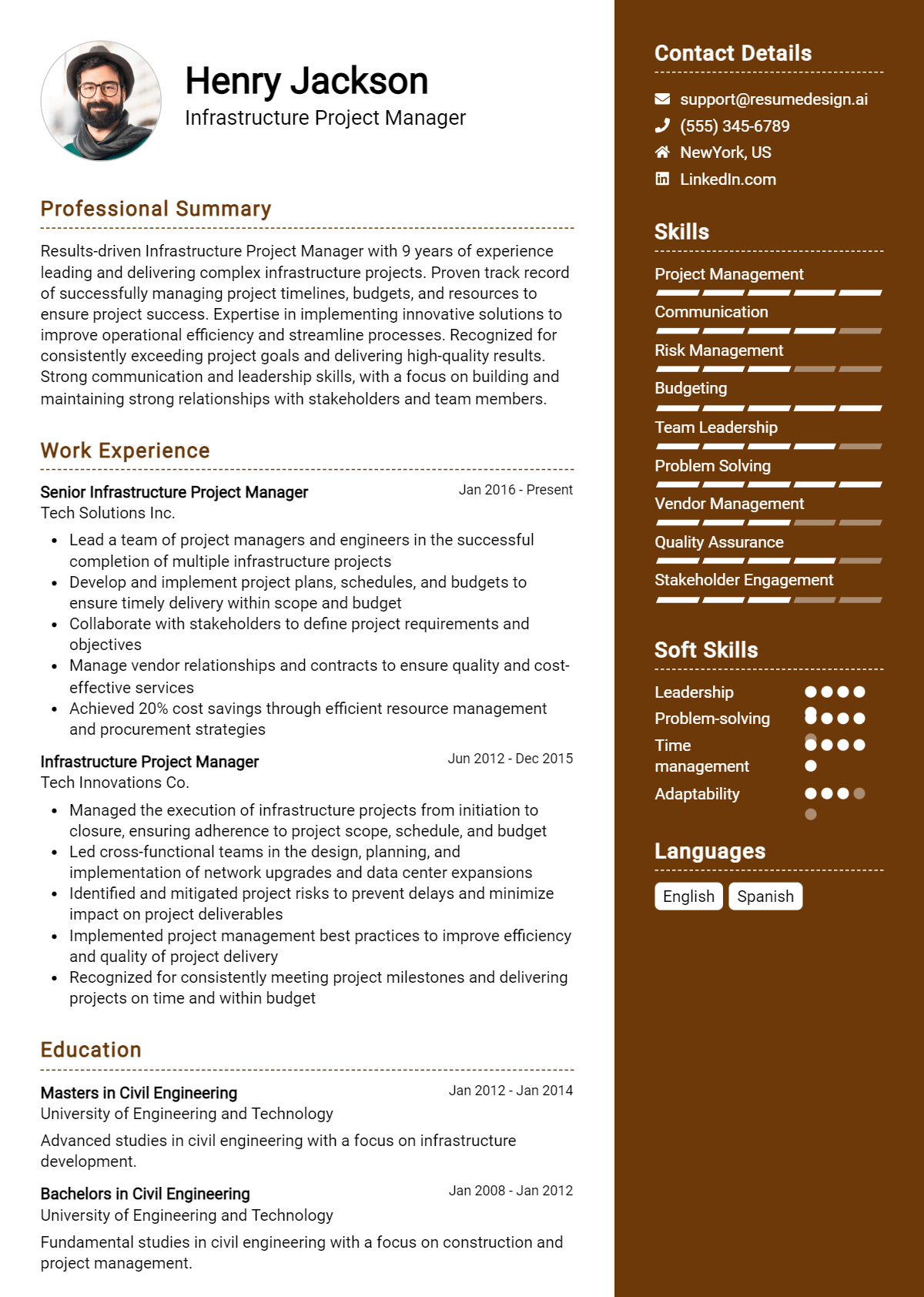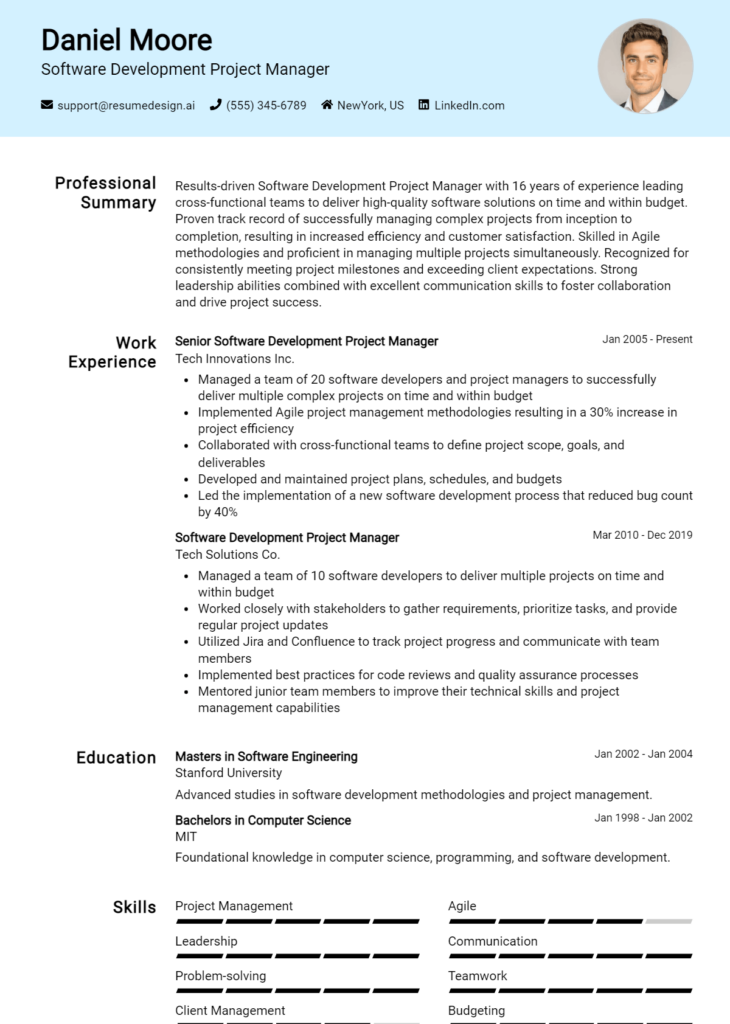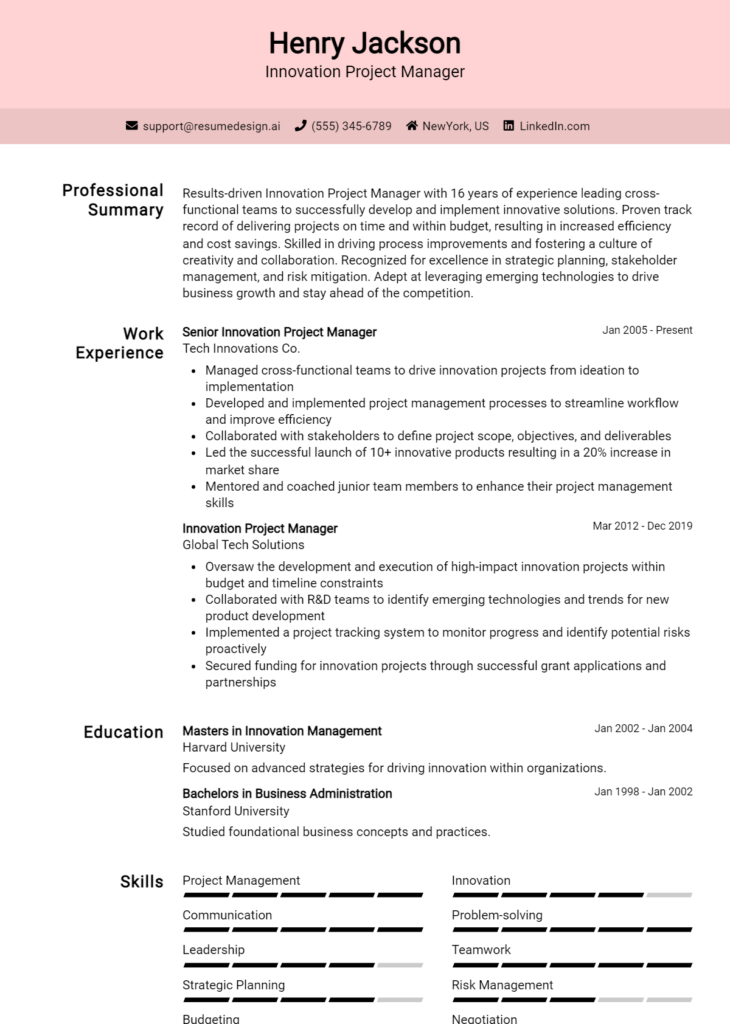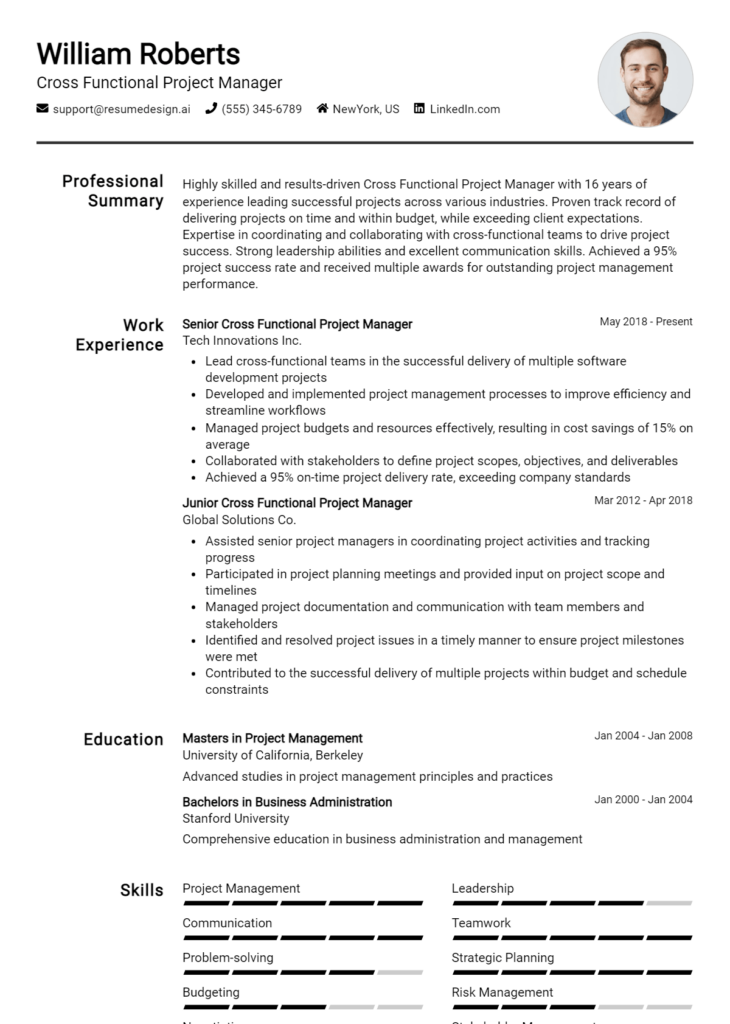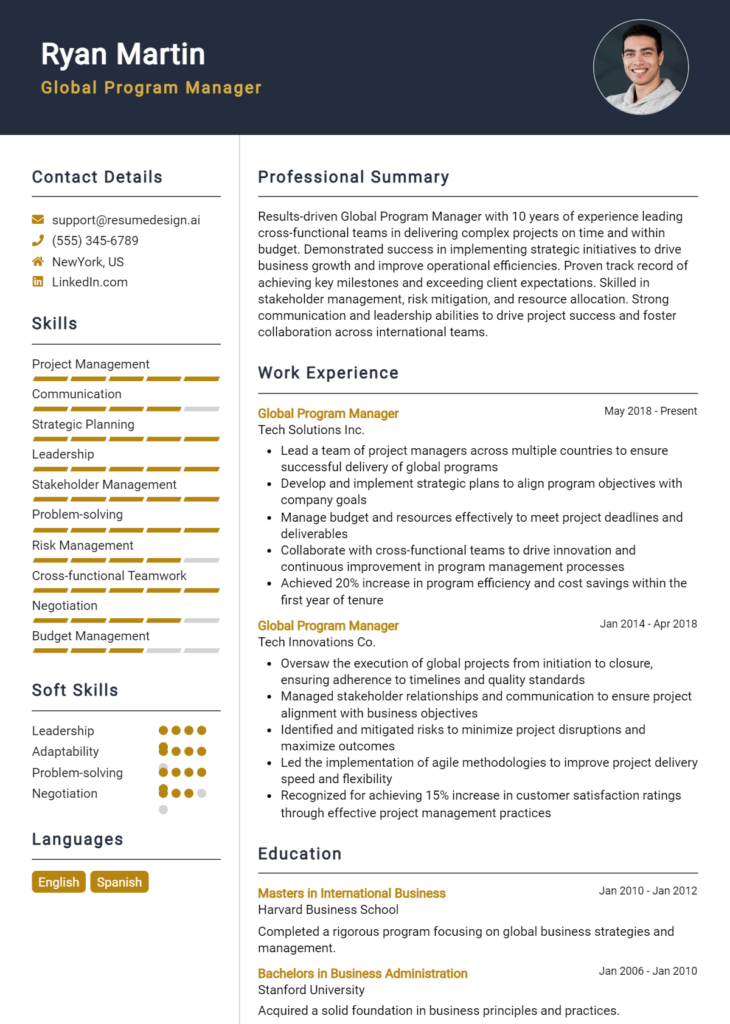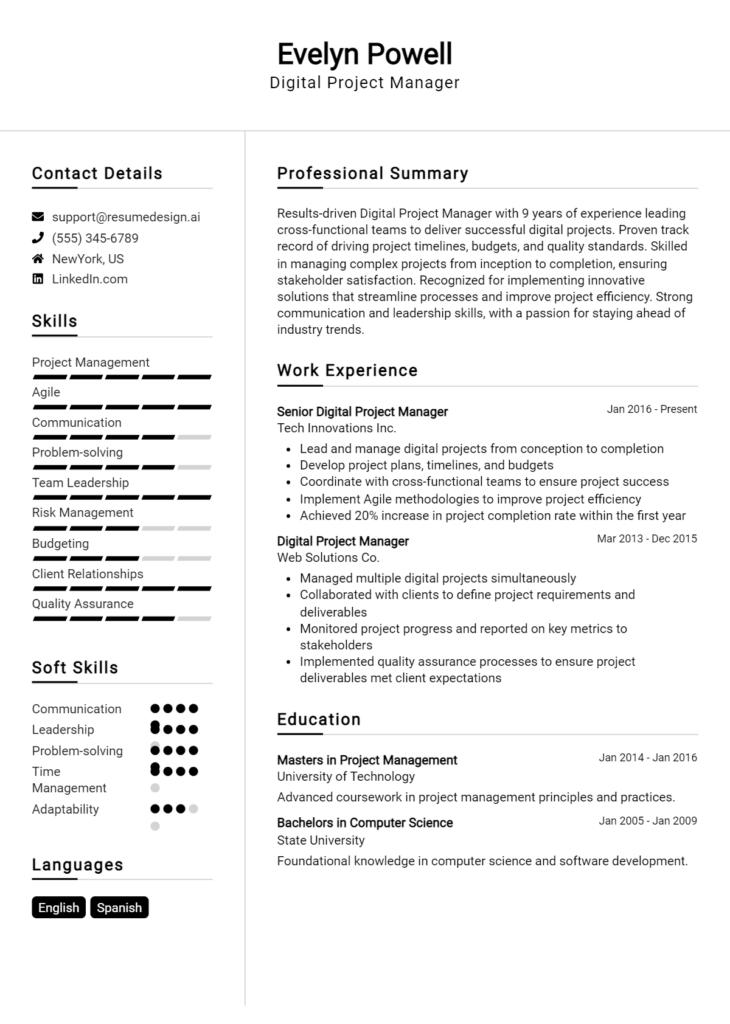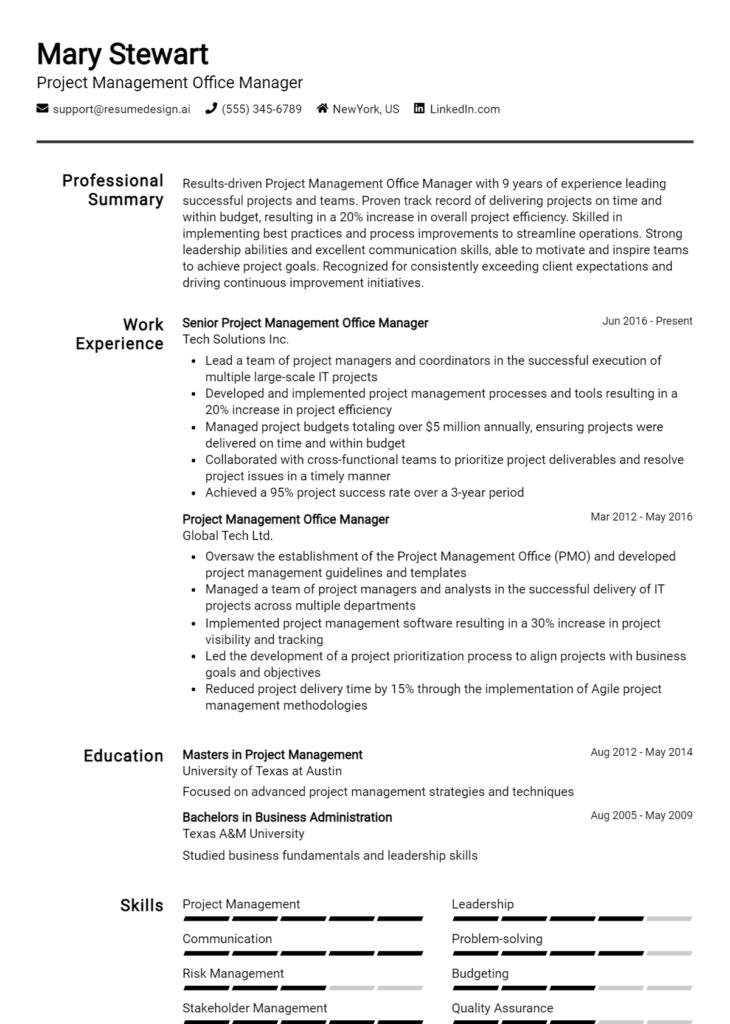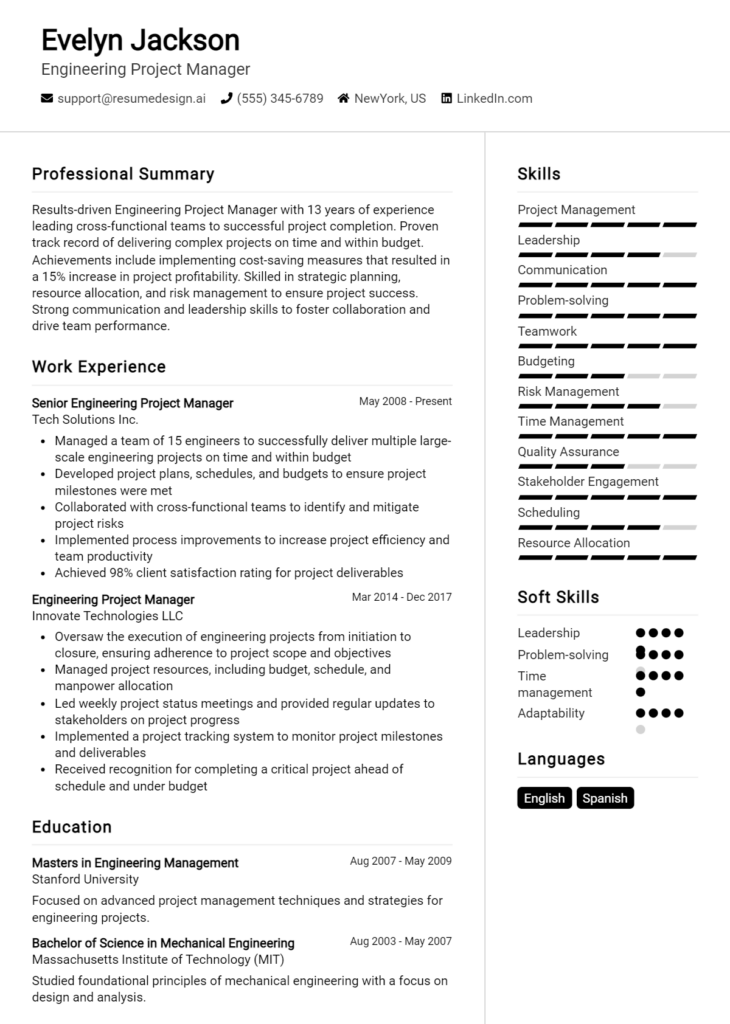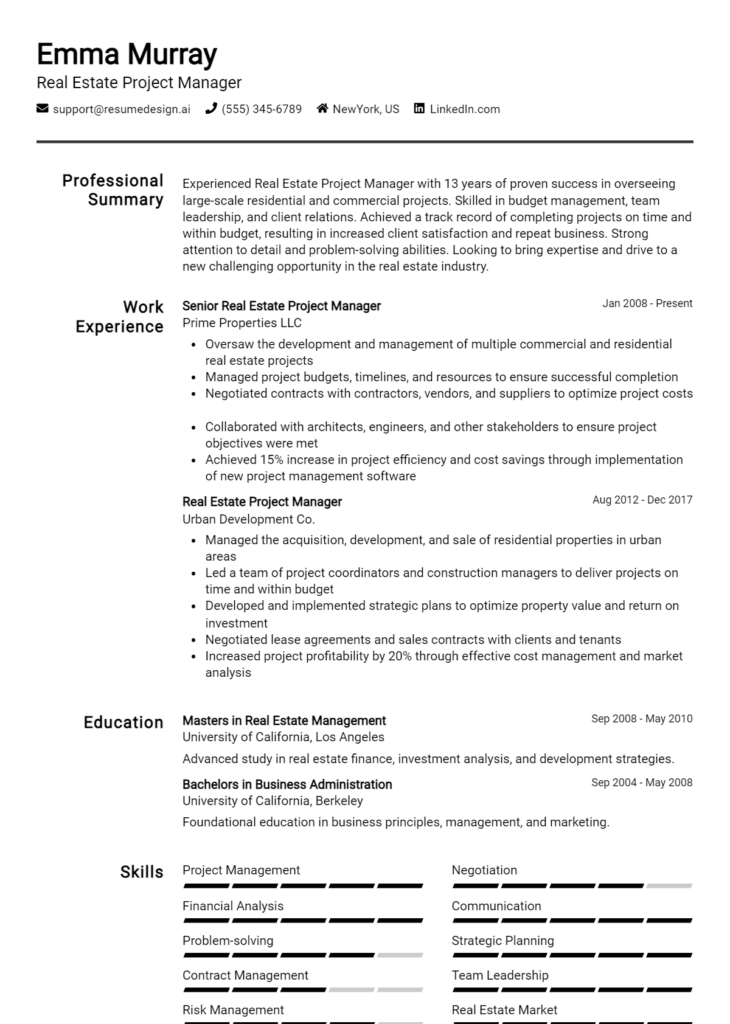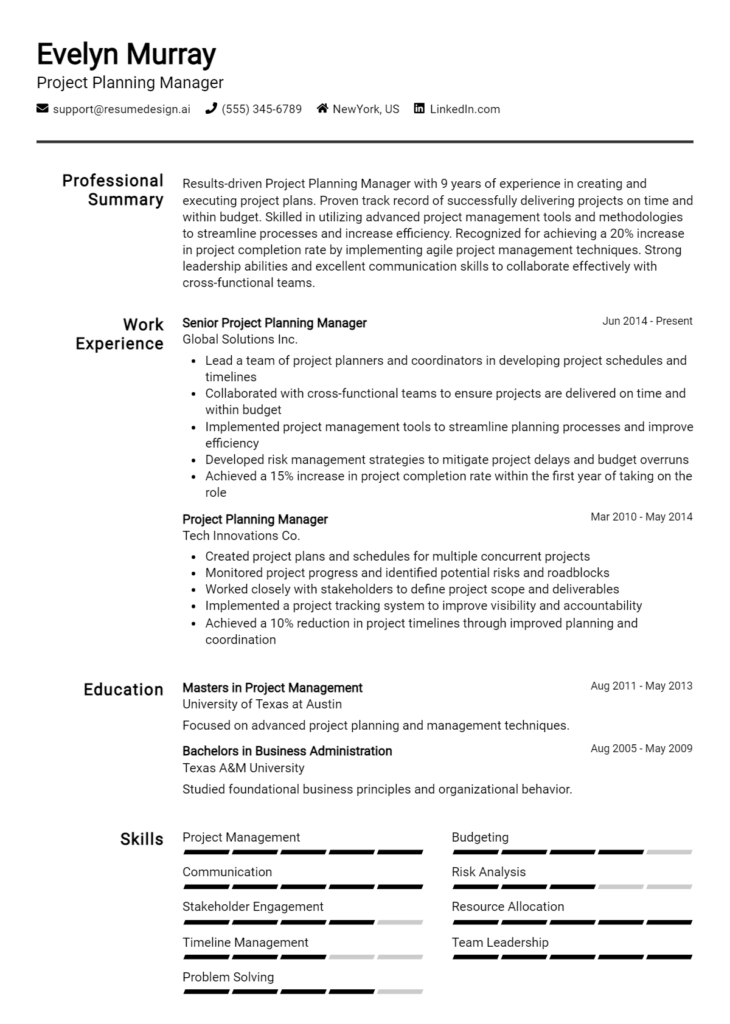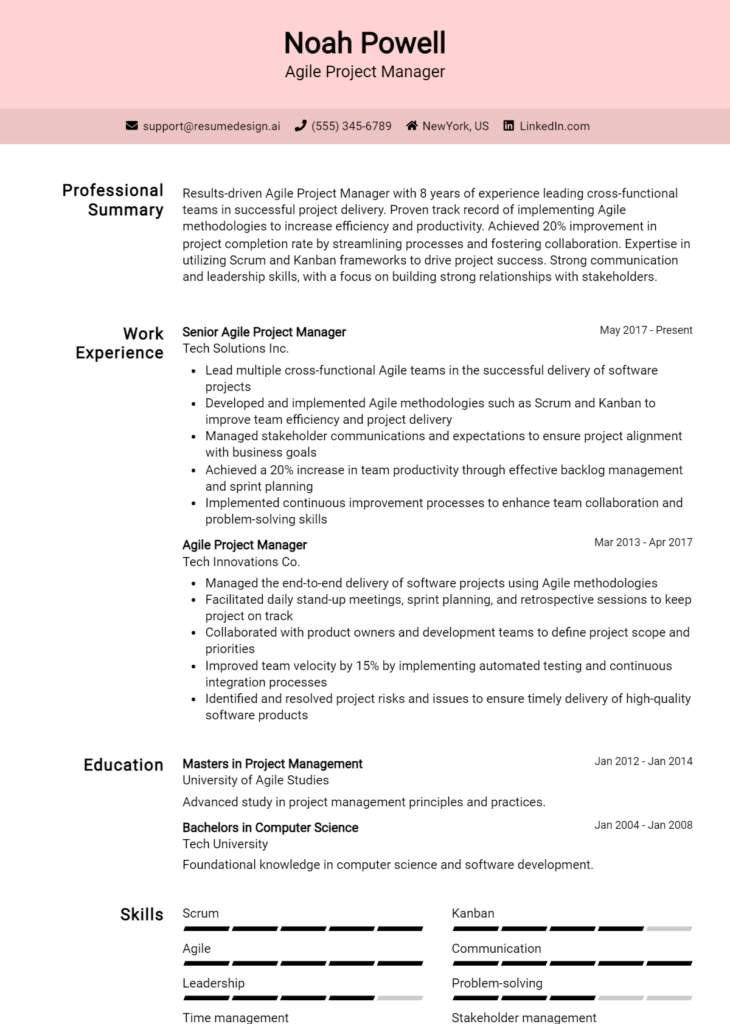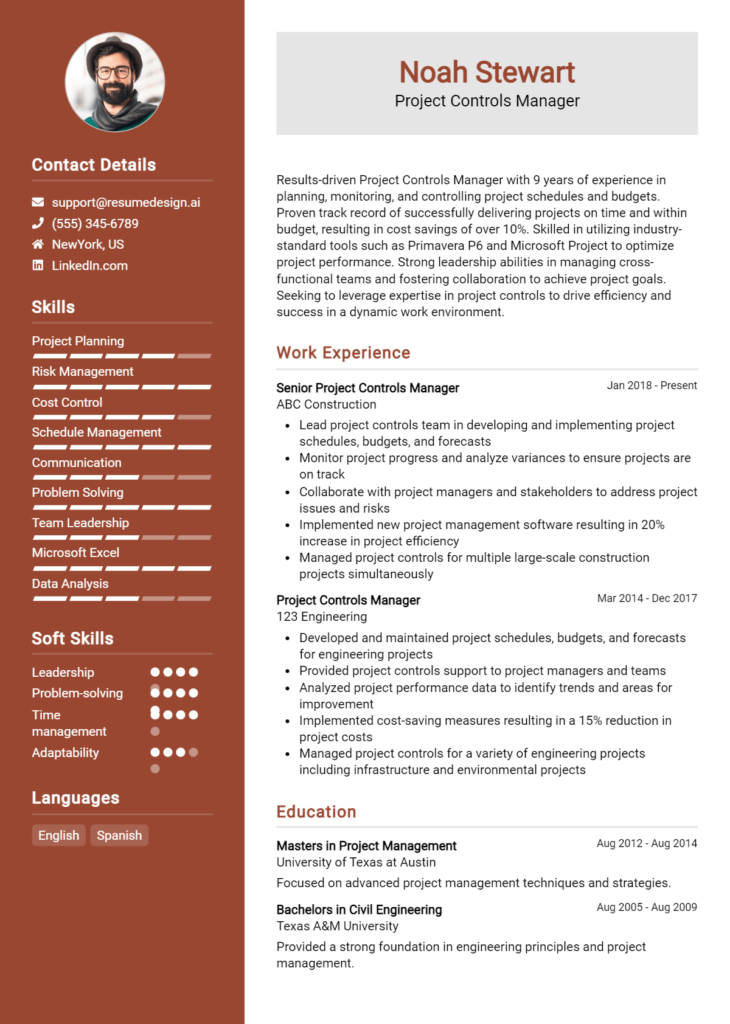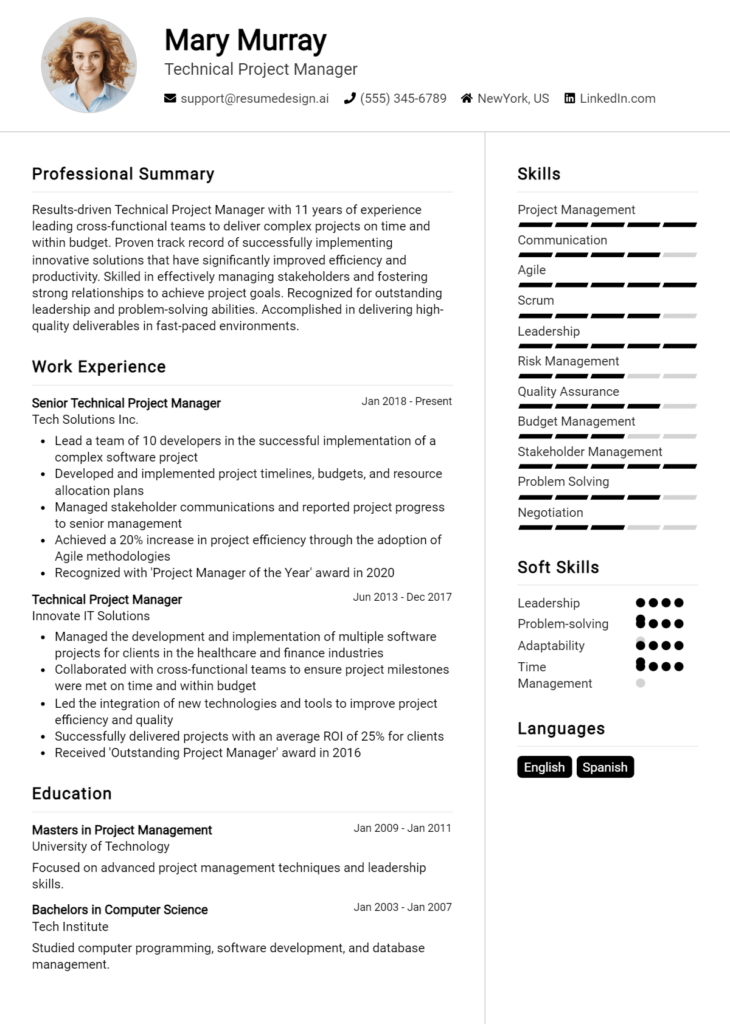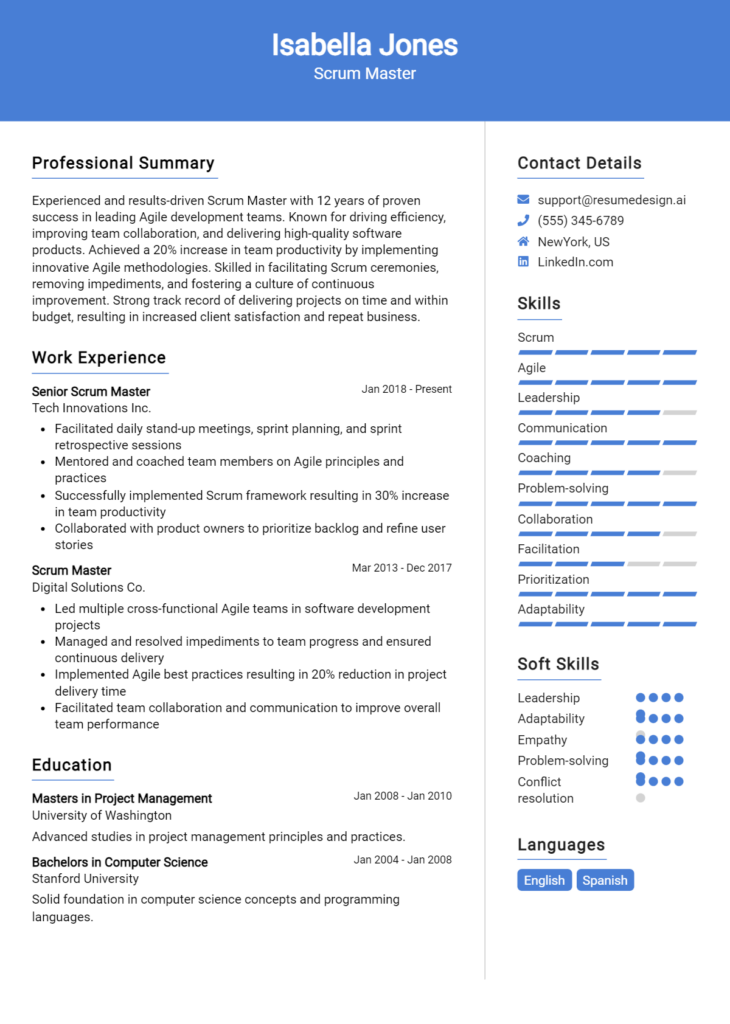Infrastructure Project Manager Core Responsibilities
An Infrastructure Project Manager plays a vital role in coordinating projects that involve various technical and operational elements, ensuring seamless collaboration across departments. Key responsibilities include planning, executing, and overseeing infrastructure projects while managing budgets and timelines. Essential skills encompass technical proficiency, operational insight, and strong problem-solving abilities, which are crucial for addressing challenges that arise. A well-crafted resume should effectively highlight these qualifications, demonstrating how they align with the organization's overall goals and objectives.
Common Responsibilities Listed on Infrastructure Project Manager Resume
- Developing project plans and schedules to ensure timely delivery.
- Coordinating cross-functional teams to align project objectives.
- Managing project budgets and resource allocation effectively.
- Assessing project risks and implementing mitigation strategies.
- Monitoring project progress and making adjustments as necessary.
- Communicating updates to stakeholders and team members.
- Ensuring compliance with industry regulations and standards.
- Conducting post-project evaluations to identify areas for improvement.
- Facilitating training and support for team members on new systems.
- Negotiating contracts with vendors and service providers.
- Implementing best practices in project management methodologies.
- Collaborating with IT, engineering, and operations teams to achieve project goals.
High-Level Resume Tips for Infrastructure Project Manager Professionals
In the competitive field of infrastructure project management, a well-crafted resume serves as a vital tool for professionals looking to make a strong impression on potential employers. As the first point of contact between a candidate and an organization, your resume must effectively convey not only your technical skills and project management expertise but also your accomplishments and leadership capabilities. A tailored resume that highlights relevant experience and achievements can differentiate you from other candidates, showcasing your suitability for the role. This guide will provide practical and actionable resume tips specifically tailored for Infrastructure Project Manager professionals, ensuring your application stands out in a crowded job market.
Top Resume Tips for Infrastructure Project Manager Professionals
- Tailor your resume to match the specific job description by incorporating relevant keywords and phrases.
- Highlight your project management certifications (e.g., PMP, PRINCE2) prominently to establish credibility.
- Showcase relevant experience by outlining key projects you've managed, including details on budget, scope, and timelines.
- Quantify your achievements with metrics, such as percentage of cost savings, improved efficiency, or successful project completions.
- Include industry-specific skills such as risk management, stakeholder engagement, and contract negotiation.
- Utilize a clean, professional format that enhances readability and makes it easy for hiring managers to find key information.
- Incorporate a summary statement that succinctly captures your career objectives and unique qualifications.
- Use action verbs to describe your responsibilities and contributions, emphasizing your proactive approach to project management.
- List relevant software and tools you are proficient in, such as Microsoft Project, Primavera, or AutoCAD, to demonstrate technical expertise.
- Keep your resume concise and focused, ideally one to two pages, to maintain the reader's attention.
By implementing these targeted resume tips, you can significantly enhance your chances of landing a job in the Infrastructure Project Manager field. A well-structured and tailored resume will not only reflect your qualifications but also convey your commitment to excellence in project management, making you an appealing candidate to potential employers.
Why Resume Headlines & Titles are Important for Infrastructure Project Manager
In the competitive field of infrastructure project management, a resume headline or title serves as a vital first impression that can significantly influence a hiring manager's perception of a candidate. A strong headline succinctly encapsulates the candidate’s key qualifications and expertise, effectively summarizing their potential value to the organization in just a few words. By carefully crafting a concise and relevant headline that directly relates to the job being applied for, candidates can immediately grab the attention of hiring managers, setting the stage for the rest of their resume. An impactful title not only enhances clarity but also positions the applicant as a strong fit for the role, increasing the likelihood of further consideration.
Best Practices for Crafting Resume Headlines for Infrastructure Project Manager
- Keep it concise: Aim for a headline that is brief yet informative, ideally one sentence or a few impactful words.
- Be specific: Tailor your headline to the specific infrastructure project management role you are applying for, highlighting relevant skills and experiences.
- Use strong action words: Start with powerful verbs or adjectives that convey your expertise and achievements.
- Highlight key qualifications: Focus on the most important qualifications that align with the job description.
- Incorporate industry keywords: Utilize relevant terminology that resonates with the infrastructure and project management sector.
- Showcase unique selling points: Identify what sets you apart from other candidates and incorporate that into your headline.
- Avoid jargon: While you want to demonstrate expertise, ensure that your headline is easily understandable to all readers.
- Revise for impact: Review and refine your headline until it clearly conveys your strengths and grabs attention.
Example Resume Headlines for Infrastructure Project Manager
Strong Resume Headlines
Results-Driven Infrastructure Project Manager with 10+ Years of Experience in Large-Scale Developments
Certified PMP with Proven Track Record in Delivering Complex Infrastructure Projects on Time and Within Budget
Dynamic Infrastructure Project Leader Specializing in Risk Management and Stakeholder Engagement
Strategic Infrastructure Project Manager Focused on Sustainable Solutions and Innovative Practices
Weak Resume Headlines
Project Manager
Experienced in Construction
Infrastructure Specialist
The strong headlines are effective because they are tailored, specific, and articulate the candidate's unique strengths and experiences directly relevant to the infrastructure project management role. They communicate essential qualifications and achievements in a way that piques interest. In contrast, the weak headlines fail to impress due to their vagueness and lack of detail. These generic titles do not provide a clear indication of the candidate's qualifications or unique contributions, making it difficult for hiring managers to see the value the applicant could bring to their organization.
Writing an Exceptional Infrastructure Project Manager Resume Summary
A well-crafted resume summary is crucial for an Infrastructure Project Manager as it serves as the initial hook that captures the attention of hiring managers. This concise statement is an opportunity to highlight key skills, relevant experience, and notable accomplishments that align with the job role. An impactful summary not only showcases what the candidate brings to the table but also sets the tone for the entire resume, making it easier for hiring managers to quickly assess qualifications. Tailoring this summary to the specific job being applied for ensures that it resonates with the employer's needs, making it an indispensable component of a successful job application.
Best Practices for Writing a Infrastructure Project Manager Resume Summary
- Quantify Achievements: Use specific numbers to demonstrate the impact of your work, such as budget sizes, project timelines, or team sizes.
- Focus on Key Skills: Highlight skills that are specifically relevant to infrastructure project management, such as risk assessment, stakeholder management, and resource allocation.
- Tailor for the Job Description: Customize the summary to reflect the requirements and responsibilities outlined in the job posting.
- Keep it Concise: Aim for 3-5 sentences that capture the essence of your qualifications without overwhelming the reader.
- Use Action-Oriented Language: Start sentences with strong action verbs to convey confidence and initiative.
- Highlight Relevant Certifications: Mention any relevant certifications, such as PMP or Agile, that enhance your qualifications for the role.
- Showcase Leadership and Teamwork: Illustrate your ability to lead teams and collaborate with various stakeholders effectively.
- Reflect Industry Knowledge: Demonstrate familiarity with industry standards, regulations, and best practices in infrastructure management.
Example Infrastructure Project Manager Resume Summaries
Strong Resume Summaries
Dynamic Infrastructure Project Manager with over 10 years of experience managing multimillion-dollar projects, achieving a 20% reduction in costs through effective resource allocation and risk management strategies.
Results-driven professional with a proven track record of leading cross-functional teams to deliver complex infrastructure projects on time and within budget, including a $5 million highway expansion that exceeded performance targets by 15%.
Accomplished Infrastructure Project Manager adept at fostering stakeholder relationships and guiding project lifecycles from inception to completion, evidenced by successfully delivering 95% of projects ahead of schedule while maintaining a 98% client satisfaction rate.
Weak Resume Summaries
Experienced project manager looking for opportunities in infrastructure.
Skilled in managing projects and teams, with some experience in infrastructure.
The strong resume summaries stand out because they provide specific, quantifiable achievements and directly relate to the infrastructure project management role. They highlight the candidate's experience, skills, and successes, making a compelling case for their candidacy. In contrast, the weak summaries lack detail and specificity, making it difficult for hiring managers to gauge the candidate's qualifications or impact, ultimately failing to leave a memorable impression.
Work Experience Section for Infrastructure Project Manager Resume
The work experience section of an Infrastructure Project Manager resume is essential as it serves as a testament to the candidate's technical expertise, leadership capabilities, and track record of delivering high-quality projects. This section not only highlights the individual's ability to manage diverse teams and navigate complex infrastructure projects but also emphasizes the importance of quantifying achievements to demonstrate impact. Aligning work experience with industry standards ensures that candidates effectively communicate their skills and accomplishments, making them stand out in a competitive job market.
Best Practices for Infrastructure Project Manager Work Experience
- Clearly outline technical skills relevant to infrastructure management, such as project management software and methodologies.
- Quantify achievements with specific metrics, such as percentage improvements, budget savings, or project timelines met.
- Use action verbs to describe responsibilities and accomplishments, showcasing initiative and leadership.
- Highlight collaboration by detailing experience working with cross-functional teams, stakeholders, and clients.
- Focus on industry standards and best practices, ensuring that your experience aligns with current infrastructure trends.
- Tailor each job description to the specific role you are applying for, emphasizing relevant experience and skills.
- Include certifications and training that demonstrate ongoing professional development in infrastructure management.
- Keep descriptions clear and concise, ensuring that each point adds value to your overall narrative.
Example Work Experiences for Infrastructure Project Manager
Strong Experiences
- Successfully managed a $5 million infrastructure upgrade project, completing it 20% under budget and two weeks ahead of schedule.
- Led a cross-functional team of 15 engineers and contractors in the implementation of a new data center, resulting in a 30% increase in operational efficiency.
- Implemented risk management strategies that reduced project delays by 25%, contributing to a significant improvement in stakeholder satisfaction ratings.
- Oversaw the transition to cloud-based infrastructure, achieving a 40% reduction in operational costs while maintaining compliance with industry regulations.
Weak Experiences
- Worked on various projects without specifying roles or contributions, leading to a lack of clarity about impact.
- Managed a team, but did not provide details on team size, project scope, or outcomes achieved.
- Assisted in project planning, but did not quantify results or highlight specific skills used.
- Participated in meetings and discussions related to infrastructure without illustrating direct contributions or achievements.
The examples provided showcase strong experiences that highlight quantifiable outcomes, technical leadership, and collaboration, demonstrating the candidate's impact on projects. In contrast, the weak experiences lack specificity and measurable achievements, making it difficult to assess the candidate's true capabilities and contributions. Strong experiences clearly communicate the value the candidate brings to potential employers, while weak experiences fail to make a compelling case.
Education and Certifications Section for Infrastructure Project Manager Resume
The education and certifications section of an Infrastructure Project Manager resume is crucial as it serves to showcase the candidate's academic foundation, relevant certifications, and commitment to ongoing professional development. This section not only highlights the educational qualifications that align with the demands of the role but also emphasizes specialized training and industry-recognized credentials that enhance the candidate's credibility. By including relevant coursework and certifications, candidates can effectively demonstrate their preparedness for managing complex infrastructure projects, thereby increasing their appeal to potential employers.
Best Practices for Infrastructure Project Manager Education and Certifications
- Prioritize relevant degrees in fields such as Civil Engineering, Construction Management, or Project Management.
- Include industry-recognized certifications, such as PMP (Project Management Professional), PRINCE2, or CAPM (Certified Associate in Project Management).
- Detail relevant coursework that aligns with infrastructure project management, such as risk management, budgeting, and resource allocation.
- Highlight any specialized training in tools or software commonly used in infrastructure projects, such as MS Project or Primavera P6.
- Regularly update the section to reflect new qualifications or certifications obtained.
- Consider including online courses or workshops that demonstrate a commitment to continuous learning in the field.
- Be specific about the dates and institutions for each educational achievement and certification.
- Use clear formatting to enhance readability and ensure important details stand out.
Example Education and Certifications for Infrastructure Project Manager
Strong Examples
- M.S. in Civil Engineering, University of California, Berkeley, 2020
- PMP (Project Management Professional), Project Management Institute, Certified 2021
- Certificate in Construction Management, Stanford University, Completed 2022
- B.S. in Construction Science, Texas A&M University, 2018
Weak Examples
- B.A. in History, University of Texas, 2015
- Certification in Basic Computer Skills, Online Course, 2020
- Diploma in Interior Design, Local Community College, 2019
- Outdated certification in Microsoft Office, 2018
The strong examples are considered effective as they directly relate to the skills and knowledge required for an Infrastructure Project Manager, demonstrating both relevant education and recognized credentials. In contrast, the weak examples include degrees and certifications that do not pertain to infrastructure management, which could detract from the candidate's perceived suitability for the role. Including pertinent qualifications strengthens the candidate's position in a competitive job market.
Top Skills & Keywords for Infrastructure Project Manager Resume
As an Infrastructure Project Manager, the ability to effectively manage complex projects requires a diverse set of skills that not only demonstrate technical proficiency but also showcase strong interpersonal capabilities. A well-crafted resume that highlights these skills is essential for standing out in a competitive job market. Employers seek candidates who can seamlessly navigate the intricacies of project management while fostering collaboration among teams and stakeholders. By emphasizing both hard and soft skills, you can present a comprehensive picture of your qualifications and readiness to tackle the challenges of infrastructure projects. For a deeper dive into the essential skills needed for this role, as well as how to effectively present your work experience, read on.
Top Hard & Soft Skills for Infrastructure Project Manager
Soft Skills
- Leadership
- Communication
- Team Collaboration
- Problem-Solving
- Time Management
- Adaptability
- Conflict Resolution
- Negotiation
- Critical Thinking
- Emotional Intelligence
- Stakeholder Engagement
- Decision Making
- Active Listening
- Presentation Skills
- Interpersonal Skills
- Cultural Awareness
- Mentoring and Coaching
- Customer Service Orientation
Hard Skills
- Project Management Software (e.g., MS Project, Primavera)
- Risk Management
- Budgeting and Financial Forecasting
- Contract Management
- Quality Assurance
- Infrastructure Design Principles
- Knowledge of Regulatory Compliance
- Scheduling Techniques
- Data Analysis and Reporting
- Technical Documentation
- Construction Management
- Resource Allocation
- Change Management
- Geographic Information Systems (GIS)
- Engineering Fundamentals
- Sustainability Practices
- Procurement Processes
- Performance Metrics and KPIs
Stand Out with a Winning Infrastructure Project Manager Cover Letter
I am writing to express my interest in the Infrastructure Project Manager position at [Company Name] as advertised on [Job Board/Company Website]. With over [X years] of experience managing large-scale infrastructure projects and a proven track record of delivering them on time and within budget, I am excited about the opportunity to contribute my skills and expertise to your esteemed team. My background in engineering, combined with my strong leadership abilities, positions me well to oversee complex projects and drive them to successful completion.
Throughout my career, I have successfully led diverse teams in the planning, execution, and monitoring of various infrastructure initiatives, including transportation systems, utilities, and public works. My ability to coordinate cross-functional teams and engage stakeholders has been key to my success, ensuring that all project phases align with strategic goals and comply with regulatory requirements. At [Previous Company Name], I spearheaded a [specific project], which not only met the budgetary constraints but also enhanced the operational efficiency of the infrastructure, resulting in a [specific percentage] increase in performance metrics.
I am particularly drawn to [Company Name] because of its commitment to innovative infrastructure solutions and sustainability. I am eager to bring my expertise in agile project management methodologies and risk assessment to your organization, ensuring that we can adapt to challenges while maintaining project integrity. My strategic planning skills, combined with an eye for detail, allow me to foresee potential obstacles and implement effective mitigation strategies, which I believe will be invaluable to your project portfolio.
Thank you for considering my application. I am looking forward to the opportunity to discuss how my background, skills, and enthusiasms align with the goals of [Company Name]. I am excited about the prospect of contributing to your projects and helping to shape the future of infrastructure in our communities. Please feel free to contact me at [Your Phone Number] or [Your Email] to arrange a convenient time for a discussion.
Common Mistakes to Avoid in a Infrastructure Project Manager Resume
When crafting a resume for an Infrastructure Project Manager position, it's crucial to present your qualifications and experience effectively. However, many candidates make common mistakes that can detract from their overall appeal. Avoiding these pitfalls can significantly enhance your chances of standing out to potential employers and showcasing your project management skills and expertise in infrastructure development.
Using a Generic Template: Many candidates rely on one-size-fits-all resume templates that fail to highlight their specific skills and experiences relevant to infrastructure project management. Tailoring your resume to the job description is essential.
Neglecting Keywords: Not incorporating industry-specific keywords can lead to your resume being overlooked by Applicant Tracking Systems (ATS). Make sure to include relevant terms that match the job listing.
Lack of Quantifiable Achievements: Failing to include measurable accomplishments can weaken your resume. Instead of stating general responsibilities, use numbers and percentages to demonstrate the impact of your work.
Overloading with Technical Jargon: While technical knowledge is important, overly complex language can alienate readers. Aim for clarity and ensure that your resume is accessible to both technical and non-technical hiring managers.
Ignoring Soft Skills: Infrastructure Project Managers need strong leadership and communication skills. Omitting these soft skills can paint an incomplete picture of your capabilities. Be sure to highlight how you've led teams and communicated with stakeholders.
Inconsistent Formatting: A cluttered or inconsistent format can make your resume difficult to read. Use clear headings, bullet points, and consistent font styles to create a professional appearance.
Including Irrelevant Experience: Many candidates list every job they've ever had, regardless of relevance. Focus on experiences that directly relate to infrastructure project management to keep your resume concise and impactful.
Spelling and Grammar Errors: Typos and grammatical mistakes can undermine your professionalism. Always proofread your resume multiple times or ask a colleague to review it before submission.
Conclusion
As we conclude our discussion on the pivotal role of an Infrastructure Project Manager, it's clear that this position demands a unique blend of technical skills, leadership qualities, and strategic thinking. We explored the key responsibilities, including overseeing infrastructure projects from inception to completion, managing budgets, coordinating with stakeholders, and ensuring that projects adhere to safety and compliance standards. Additionally, we emphasized the importance of effective communication and collaboration in navigating the complexities of infrastructure initiatives.
Now, it's time to reflect on your own professional journey. Are you showcasing your skills and experience effectively in your resume? With the competitive landscape of project management, having a standout resume is crucial. We encourage you to take a moment to review your Infrastructure Project Manager resume and ensure it highlights your achievements and aligns with industry standards.
To assist you in this process, consider utilizing the available resources that can elevate your job application. Explore resume templates that can provide a polished and professional layout for your experience. Use our resume builder to craft a tailored resume that reflects your unique qualifications. For inspiration, check out our resume examples that showcase successful Infrastructure Project Managers. Don’t forget the importance of a compelling introduction; our cover letter templates can help you make a strong first impression.
Take the next step in your career journey by refining your resume today!

